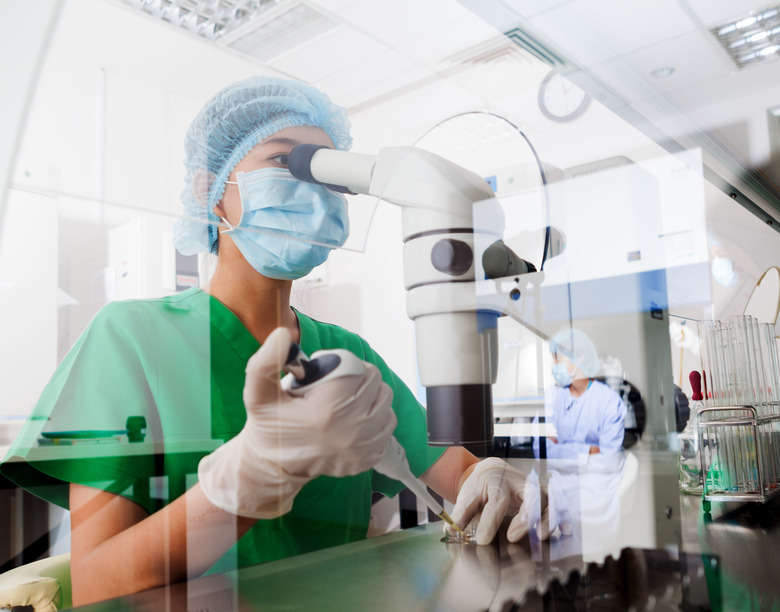5 Recent Breakthroughs That Show Why Cancer Research Is So Important
"Cancer is bad" is right up there with "sky is blue" in terms of controversial statements. The American Cancer Association predicts that there will be 1,688,780 new cancer diagnoses and over 600,000 cancer deaths in the U.S. in 2017 – meaning there's a high probability that you'll know someone affected.
National research funding is among the best ways for scientists to fight cancer. But, unfortunately, that funding isn't guaranteed. In fact, the current administration has proposed a 20 percent cut to the National Institutes of Health, which would reduce cancer funding.
Want to help? Read on for a few recent examples of why cancer funding is essential – and why you should ask your representatives to preserve cancer research funding.
Bacteria May Kill Cancer Cells
Bacteria May Kill Cancer Cells
While bacteria were once thought of as disease-causers (which they still can be), researchers have also learned that these little bugs can have health benefits, too – including cancer-fighting properties, according to researchers at Rush University.
The bacteria work by affecting the way cancer cells die. Normally, a dying cell sends signals to its neighbors – essentially letting them know there's a cell that needs to be replaced. The researchers found that a toxin from the bacteria Pseudomonas aeruginosa can disrupt those signals, so cells that die won't be immediately replaced. While the research is early in development, it could complement other cancer treatments to fight cancer growth.
Certain Foods Can Starve Cancer Cells
Certain Foods Can Starve Cancer Cells
Food as medicine isn't a new concept – the use of foods in alternative medicine dates back thousands of years – but health research means we're learning more about it than ever. Case in point: new research conducted at the University of Texas, Austin, that discovered that certain foods that may "starve" cancer cells.
They found that ursolic acid, a compound found in apples, grapes and turmeric, helped block prostate cancer cells from taking up the nutrients they need to grow. Without adequate nutrition, the cells shrink and die. While this research is still early in development – the researchers tested its efficacy in animals, not humans – it could eventually lead to new drug development.
A New Link Between Blood Vessels and Cancer Growth
A New Link Between Blood Vessels and Cancer Growth
We've known for decades that blood vessel development – a process called angiogenesis – is essential for tumor growth. Once the tumor reaches a certain size, it needs to grow its own blood vessels to deliver nutrients and oxygen to the cancer cells.
What we didn't know until recently, though, is that blood vessel cells can develop into tumors. Researchers from the Medical College of Georgia at Augusta University found that pericytes – a specialized type of cell that help form the outer lining of your blood vessels – can be highly cancerous when mutated. The blood vessel cells themselves can start forming a tumor, begin the process of angiogenesis, which in turn stimulates more tumor growth.
Better understanding this process may help researchers develop drugs to target it, potentially leading to new therapies for aggressive cancers.
Less Invasive Colonoscopies Through Technology
Less Invasive Colonoscopies Through Technology
If you're ever had a colonoscopy, you know even the mildest of procedures on your colon and intestines can feel pretty darn invasive. In fact, 20 percent of at-risk people who avoided getting a colonoscopy did it because they disliked the procedure, according to market research conducted by StopColonCancerNow.com.
Doctors at Loyola University Health System in Chicago are offering less invasive options using a pill camera, called the PillCam™ Colon 2. The cameras wirelessly record images as they travel through the patient's digestive tract, allowing doctors to screen for potential health concerns easily.
As advances in medical technology make these services more affordable and easier to obtain, they could help more people get the colon cancer screening they need – cutting down on late diagnosis.
Cancer Cells “Edit” Their DNA to Grow Faster
Cancer Cells "Edit" Their DNA to Grow Faster
Genetic mutations have always been a part of cancer development – some cancer-fighting genes, like p53, are lost or mutated in up to half of cancer cases. But emerging health research is telling us more about the surprising ways cancer cells change their DNA to grow more efficiently.
For example, new research from the Stowers Institute for Medical Research found that cancer cells "streamline" their DNA by deleting large sections of genetic material called ribosomal DNA. While deleting DNA can mean the cells divide faster, it also makes them more unstable. The researchers found that cells missing more ribosomal DNA were less able to recover after DNA damage. And because both radiation and some chemotherapies work by damaging DNA, this finding may help scientists find cancer cases that will respond particularly well to these treatments.
Convinced? Here’s How You Can Help Preserve Funding
Convinced? Here's How You Can Help Preserve Funding
Advocating for science doesn't have to complex – it can be as simple as picking up the phone to talk to your representative to ask them to back funding for cancer research. Use these guidelines from the American Astronomical Society to make your call and success and leave a lasting good impression on your representative.
Cite This Article
MLA
Tremblay, Sylvie. "5 Recent Breakthroughs That Show Why Cancer Research Is So Important" sciencing.com, https://www.sciencing.com/5-recent-breakthroughs-that-show-why-cancer-research-is-so-important-13400299/. 27 June 2017.
APA
Tremblay, Sylvie. (2017, June 27). 5 Recent Breakthroughs That Show Why Cancer Research Is So Important. sciencing.com. Retrieved from https://www.sciencing.com/5-recent-breakthroughs-that-show-why-cancer-research-is-so-important-13400299/
Chicago
Tremblay, Sylvie. 5 Recent Breakthroughs That Show Why Cancer Research Is So Important last modified March 24, 2022. https://www.sciencing.com/5-recent-breakthroughs-that-show-why-cancer-research-is-so-important-13400299/
